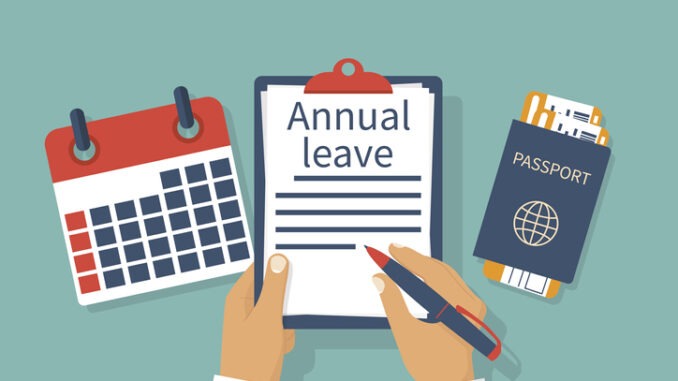
Here are some ideas to help you make sure you’re making the most of your time off now, and in the future
CREDIT: This is an edited version of an article that originally appeared on Mental Health UK
Heading off on annual leave should be an exciting moment in your work calendar – a moment of respite, when you can switch off and feel assured you’re leaving your work and pending actions in safe hands. However, often the weeks that bookmark this protected time are chaotic, with overtime and meeting-heavy days exacerbating stress levels and sometimes even leading us to question if it’s worth taking leave at all. In this piece, experts from Mental Health UK share their best ideas on what you and your colleagues can do to make time off truly relaxing and carefree.
Annual leave – or any kind of leave, including sick leave and compassionate leave – is vital to promote and maintain good physical and mental health for employees. The idea of annual leave is to give employees a hard-earned break to help them reset, clear their minds and have time to reflect and enjoy the other parts of their lives.
However, the reality is often far removed from this, with increased connectivity around the clock, relentless notifications, and easy-access apps making it hard to fully put work out of our minds. Colleagues often find themselves doing extra work in the days before their break, or returning to a sea of emails and requests.
The good news is there are practical measures we can all take to help change this experience – and this doesn’t just apply to holiday-goers, but also colleagues who are covering for others while they are on leave, as they can also make adjustments to ensure a restful holiday and a healthy return to work.
Ideas to ensure you switch off from work when you go on leave
- Mute all work chats on WhatsApp – including the ones that are social/non-work related. This might sound harsh, but seeing a colleague’s name pop up in WhatsApp – even if it’s sharing a funny meme – can start a train of thought back into work stuff. Make a concerted effort to not let your mind wander into your live projects or tasks.
- Add ‘next planned leave’ dates to your email signature up to a month before you go (usually only applicable if you’re going for a week or more). This gives people a helpful prompt to get what they need from you before you go on leave, and can help to avoid a last minute rush.
- It may sound obvious but do put an out-of-office on for your work emails (and personal emails if you are a freelancer or if you’d find it helpful). Detail in your message when you’re returning and who your out-of-office contact(s) will be and write a clear message to manage expectations about likely response rates. This should put you at ease and allow you to fully unwind, knowing that you’ve communicated your absence to the relevant people.
- Delete Teams, Slack and your work email app – or, at the very least, mute them – we need to remove the temptation to have ‘one little check in’. If you hate seeing notifications about unread emails or messages muting notifications will solve this!
- Write a handover for your direct team with any actions or information they need for reference. This can be a brief word doc or an email. Not only does this allow for a seamless transfer of tasks, it is also the responsible thing to do and it will help you to relax, knowing you’ve left things in order.
- Do your best to forget who you work for during the time you’re on leave – especially if you work in the charity sector, where people tend to be extremely passionate about what they do. This makes it easy and natural to read news articles about the cause you care about so that you can stay ‘in the loop’, but it really is so important to give yourself a complete break. Bookmark such articles to read when you’re back, if you really have to.
- Mark a few hours in your diary as ‘no appointments’ on your first day back. This just serves as a gentle reminder to colleagues that you’ve been away, and also guarantees some quiet time to catch up.
- Make sure you never send any of your senior advisors emails while they are on annual leave. I do a summary email for them that I complete throughout the week and send to them when they get back.
- Write a plan or list on your last day of items you need to pick up on your return; this will help give you a sense of closure. Make sure you’ve written down the things you want to focus on for the first three days of your return, with space for any pressing work that might have come in while you’ve been away.
- If you are in a group email request to leave it or redirect it to another colleague if you’re going away for one or more weeks. This helps to reduce the number of emails you’re CCed into. You could email the person with an update so they just have one email or document with all the relevant info.
How to be a considerate colleague, support people who are on leave and make returning less overwhelming
- Don’t schedule meetings for your colleague who’s been away on the day they’re back; try to leave their calendar free. There’s probably a mountain of emails to catch up on without having to take time out to also jump on calls too. The one exception is if they’d like to have a social catch-up to help them reconnect. Otherwise, strive to give them one meeting-free day, to help them get their head back into gear. Later in the week you can pick up with them once they’ve had time to digest what they’ve missed.
- Line managers and colleagues should remind their peers or direct reports to mute or delete work-related communications before they go away.
- Colleagues should consider who they are copying into their emails and ask themselves ‘Is it essential for this person to see every exchange?’ ‘Is that colleague on leave?’ This helps reduce inbox overload when colleagues return to work.
- Be a supportive team mate for the returning colleague, whether you’re a line manager or peer, to help ease them back in. Answer any questions they might have about emails or work-related tasks and make sure they have time to focus without any immediate deadlines.
- As a wider team, where capacity is available, reach out to the person returning and see how they’re doing. They might have been away on holiday, but that doesn’t necessarily mean they’re feeling great or doing okay when coming back to work. Being mindful that we’re bringing our whole self to work is vital.
- Ask for help if you need it. Just because a teammate or your manager is on leave it doesn’t mean you have to do two people’s jobs at once. Be open with your line manager/another trusted colleague if you have too much on your plate; it’s likely this will lead to a redistribution of the workload.
- If you’ve received a handover email from your colleague who’s away, you could reply to it with bullet points/a status update on the tasks they’ve asked you to cover. This makes life so much simpler for both parties, and it means there’s one place where all activity is tracked.
To find out more about how Mental Health UK can provide further guidance and support on mental health in the workplace, head to our training and consultancy information.


Be the first to comment